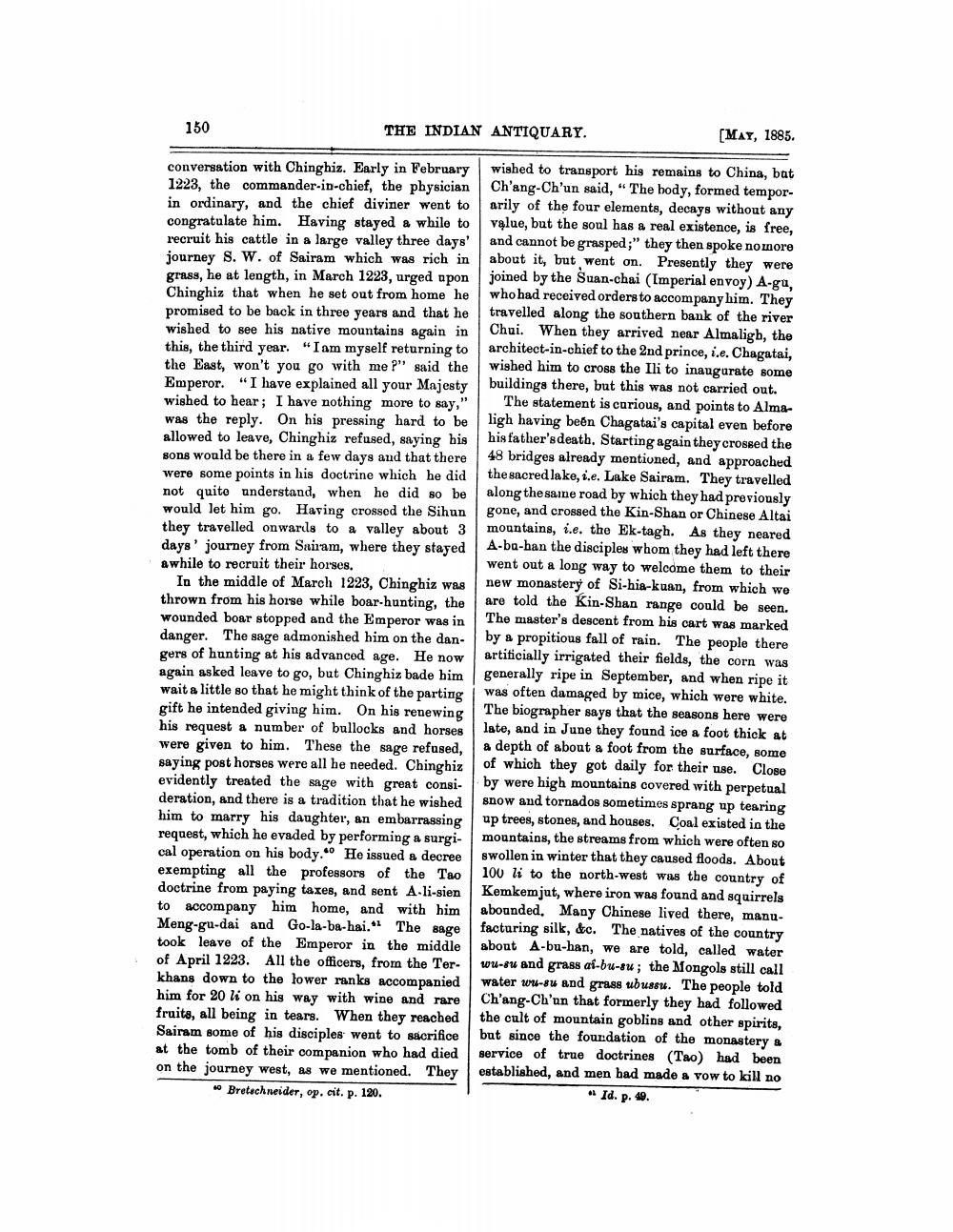________________
150
THE INDIAN ANTIQUARY.
[MAY, 1885.
conversation with Chinghiz. Early in February 1223, the commander-in-chief, the physician in ordinary, and the chief diviner went to congratulate him. Having stayed a whilo to recruit his cattle in a large valley three days' journey S. W. of Sairam which was rich in grass, he at length, in March 1223, urged upon Chinghiz that when he set out from home he promised to be back in three years and that he wished to see his native mountains again in this, the third year. "I am myself returning to the East, won't you go with me?” said the Emperor. "I have explained all your Majesty wished to hear: I have nothing more to say," was the reply. On his pressing hard to be allowed to leave, Chinghiz refused, saying his sons would be there in a few days and that there were some points in his doctrine which he did not quite understand, when he did so be would let him go. Having crossed the Sihun they travelled onwarıls to a valley about 3
about 3 days' journey from Sairam, where they stayed awhile to recruit their horses.
In the middle of March 1223, Chinghiz was thrown from his horse while boar-hunting, the wounded boar stopped and the Emperor was in danger. The sage admonished him on the dan gers of hunting at his advanced age. He now again asked leave to go, but Chinghiz bade him wait a little so that he might think of the parting gift he intended giving him. On his renewing his request a number of bullocks and horses were given to him. These the sage refused, saying post horses were all he needed. Chinghiz evidently treated the sage with great consi. deration, and there is a tradition that he wished
re is a tradition that he wished him to marry his daughter, an embarrassing request, which he evaded by performing a surgical operation on his body. He issued a decree exempting all the professors of the Tao doctrine from paying taxes, and sent A-li-sien to accompany him home, and with him Meng-gu-dai and Go-la-ba-hai." The sage took leave of the Emperor in the middle of April 1223. All the officers, from the Terkhans down to the lower ranks accompanied him for 20 li on his way with wine and rare fruits, all being in tears. When they reached Sairam some of his disciples went to sacrifice at the tomb of their companion who had died on the journey west, as we mentioned. They
· Bretschneider, op. cit. p. 120.
wished to transport his remains to China, bat Ch'ang-Ch'un said, "The body, formed temporarily of the four elements, decays without any value, but the soul has a real existence, is free, and cannot be grasped;" they then spoke no more about it, but went on. Presently they were joined by the Suan-chai (Imperial envoy) A-gu. who had received orders to accompany him. They travelled along the southern bank of the river Chui. When they arrived near Almaligb, the architect-in-chief to the 2nd prince, i.e. Chagatai, wished him to cross the Ili to inaugurate some buildings there, but this was not carried out.
The statement is curious, and points to Almaligh having been Chagatai's capital even before his father's death. Starting again they crossed the 48 bridges already mentioned, and approached the sacred lake, i.e. Lake Sairam. They travelled along the same road by which they had previously gone, and crossed the Kin-Shan or Chinese Altai mountains, i.e. the Ek-tagh. As they neared A-ba-ban the disciples whom they had left there went out a long way to welcome them to their new monastery of Si-hia-kuan, from which we are told the Kin-Shan range could be seen. The master's descent from his cart was marked by a propitious fall of rain. The people there artificially irrigated their fields, the corn was generally ripe in September, and when ripe it was often damaged by mice, which were white. The biographer says that the seasons here were late, and in June they found ice a foot thick at a depth of about a foot from the surface, some of which they got daily for their use. Close by were high mountains covered with perpetual snow and tornados sometimes sprang up tearing up trees, stones, and houses. Coal existed in the mountains, the streams from which were often so swollen in winter that they caused floods. About 100 li to the north-west was the country of Kemkemjut, where iron was found and squirrels abounded. Many Chinese lived there, manufacturing silk, &c. The natives of the country about A-bu-han, we are told, called water WW-84 and grass as-bu-8u; the Mongols still call water wu-su and grass ubussu. The people told Ch'ang-ch'un that formerly they had followed the cult of mountain goblins and other spirits, but since the foundation of the monastery & service of true doctrines (Tao) had been established, and men had made a vow to kill no
• Id. p. 49.




